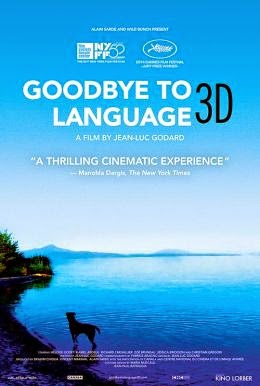Goodbye to Language
I would have guessed Jean-Luc Godard would have been the last director to make a 3D film, but then again, he has always kept people guessing. Goodbye to Language, his 42nd film, is about as incomprehensible as any of his recent films, but I can't say it's dull. I just have no idea what happened.
In reading the Wikipedia summary, I realize I totally missed that there are two couples featured in the film, not just one. The two actresses look very similar, so I had no idea. Also, it's not always a good idea to watch his films with subtitles. I don't speak French, so I have no choice, As with Film Socialisme, his last film, there are subtitles when no is speaking, and when people are speaking French, sometimes no subtitles. I also wouldn't be surprised if the subtitles are not exactly what the actors are saying. Godard is an impish filmmaker.
So what do we have here? Well, lots of shots of a dog (Godard's own, named Roxy Mieville) and two couples with a mirrored relationship. There is also lots of nudity, particularly of the female variety, which makes it Godard's most sexual film, I think (at least in the cheesecake manner of speaking). There are many references to other writers and films, such as Alexander Solzhenitsyn and Mary Shelley (toward the end of the film, the summer of 1816 is featured, with actors playing her, Percy Shelley, and Lord Byron). However, I was oblivious to any connection to Frankenstein and what I was seeing on screen.
Though the film technically is a narrative, albeit one almost impossible to decipher, I saw it more as a film collage, and an aural one as well, as many classic composers are featured. We also get Wilde-an quotes like: "Infinity and zero, the greatest inventions. No, sex and death." Or, in a man's dying words, "Avoid shattered dreams." Godard also finds it interesting that television was invented the same year as Hitler was elected chancellor of Germany (that's not actually right--there was television before 1933).
Goodbye to Language created something of a brouhaha when the National Society of Film Critics named it their best picture of 2014. This caused some bloggers to go off on how snobbish this group was for naming a film that was not on anyone else's radar (it certainly did not play Peoria). I find this to be reverse snobbism--why question why anyone likes anything? When someone does that, it reveals to me an insecurity about the complainer's own convictions.
Godard, for all the frustrations his films can engender, has never stopped growing as a filmmaker. I prefer his films of the early '60s, but why should he be imprisoned to making more of those, when it is fifty years later? I may not understand Goodbye to Language, but I respect it.
In reading the Wikipedia summary, I realize I totally missed that there are two couples featured in the film, not just one. The two actresses look very similar, so I had no idea. Also, it's not always a good idea to watch his films with subtitles. I don't speak French, so I have no choice, As with Film Socialisme, his last film, there are subtitles when no is speaking, and when people are speaking French, sometimes no subtitles. I also wouldn't be surprised if the subtitles are not exactly what the actors are saying. Godard is an impish filmmaker.
So what do we have here? Well, lots of shots of a dog (Godard's own, named Roxy Mieville) and two couples with a mirrored relationship. There is also lots of nudity, particularly of the female variety, which makes it Godard's most sexual film, I think (at least in the cheesecake manner of speaking). There are many references to other writers and films, such as Alexander Solzhenitsyn and Mary Shelley (toward the end of the film, the summer of 1816 is featured, with actors playing her, Percy Shelley, and Lord Byron). However, I was oblivious to any connection to Frankenstein and what I was seeing on screen.
Though the film technically is a narrative, albeit one almost impossible to decipher, I saw it more as a film collage, and an aural one as well, as many classic composers are featured. We also get Wilde-an quotes like: "Infinity and zero, the greatest inventions. No, sex and death." Or, in a man's dying words, "Avoid shattered dreams." Godard also finds it interesting that television was invented the same year as Hitler was elected chancellor of Germany (that's not actually right--there was television before 1933).
Goodbye to Language created something of a brouhaha when the National Society of Film Critics named it their best picture of 2014. This caused some bloggers to go off on how snobbish this group was for naming a film that was not on anyone else's radar (it certainly did not play Peoria). I find this to be reverse snobbism--why question why anyone likes anything? When someone does that, it reveals to me an insecurity about the complainer's own convictions.
Godard, for all the frustrations his films can engender, has never stopped growing as a filmmaker. I prefer his films of the early '60s, but why should he be imprisoned to making more of those, when it is fifty years later? I may not understand Goodbye to Language, but I respect it.



Comments
Post a Comment